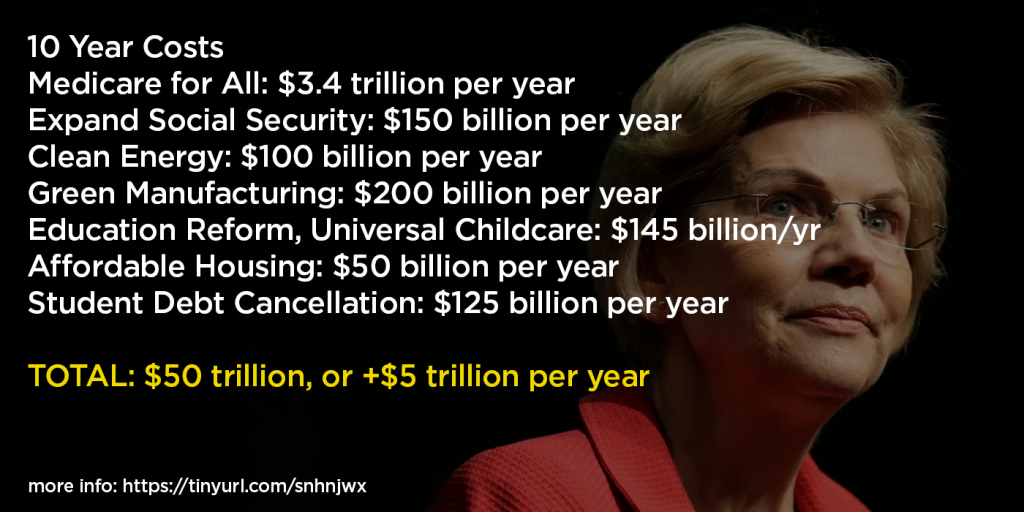In the age of simplicity, nuance is a liability, not a strength
Senator Elizabeth Warren has suspended her campaign. With comparatively more realistic and detailed plans and the talent to explain them, she should have easily beaten Senator Bernie Sanders for the hearts and minds of the progressive left wing of the party. But she didn’t. Why not? Was it sexism alone, or was more at work?
Warren Wasn’t My Preferred Candidate
First, I should state right off that I didn’t favor for Senator Warren for president, because in her ideal world, the size and scope of the federal government would be much, much bigger than my view of optimal. I’m by and large a limited government federalist, not a gigantic-federal-government liberal, so her candidacy did not naturally appeal to me. I also think major pronouncements from her campaign contained warning signs. The wealth tax is unconstitutional, as is her penchant for abolishing the Electoral College, and court-packing is an equally surprising turn toward the authoritarian. Her candidacy, overall, was significantly to the left of my views.
The battle over the proper role of the federal government in our lives is a fundamental question that we’ve been wrestling with since even before our republic was founded. Warren outlined her positions clearly and forthrightly, and they are decidedly on the left of America’s center.
Everyone has their own views on this question about the role of the federal government. And I think good people can disagree, because there’s usually a tradeoff between benefits to various constituencies and liberty, and often unexpected consequence of federal action. It’s the rare federal program that’s universally beneficial to all. While I very much support services and support for those truly in need, I have noticed that I also tend to include one test in the “optimal solution design” process that others do not: I imagine the brand new powers we’d like to hand over to the federal government in the hands of my worst ideological foe.
That may sound overly harsh, but it’s because, as we certainly know by now, federal powers last. These powers last through Democrat administrations and Republican administrations, through our lives and those of our grandchildren. They increase over time. The have a trajectory and they have momentum. Agencies and federal powers last through competent and incompetent, benevolent and vindictive administrations. Most important, the Executive Branch can and will be occupied by a variety of presidents in possession of varying degrees intelligence, ideology, religions and leadership styles.
Once granted, such federal powers almost never get rescinded. So if there’s a reasonable option short of federalization of a particular problem/solution that preserves some choice and liberty for those who value it, I tend to want to try that approach first, pivot and make adjustments to them, and only then if they’ve failed default to federalizing them. (This is short of obvious national concerns, like the military, or Center for Disease Control work. But it’s not obvious to me that we must nationalize healthcare to make major improvements, nor have we honestly grappled much with what we lose in the process of doing so.)
On healthcare, we’ve in no way exhausted sensible improvements we could make to the Affordable Care Act or successor private health insurance driven approach before we throw that all away in favor of a nationalized single payer option. We could for instance subsidize services for those truly in need, means-test benefits so they’re focused where they’re needed, but not rush to federalize solutions unless it really is the best place for that power, regardless of administration competence or ideology.
Americans have experienced ever-increasing federal spending per capita. As shown in this chart below, per-capita federal spending (in inflation-adjusted 2016 dollars) seems to march inexorably higher, except during the Obama administration, when discretionary spending actually declined. Please note that I’m not a big fan of slashing it per-capita, but I’m not entirely sure it needs to be instantly doubled or tripled, as Senator Warren would like to do.

Warren literally wanted to more than double the size of spending of the federal government, with plans totaling more than $50 trillion in new federal spending over the next decade. I don’t think such a massive change is what I think is best for our prosperity, opportunities, choices or liberty.

Washington DC decision-makers and resource allocators have suddenly became enormously popular of late, at least rhetorically.
All of this love for expanded federal powers by the progressive left is quite surprising to me in the age of Trump. Many of the same voters who see dangerous, capricious authoritarianism and the rise of a fascist state in every presidential action also want to dramatically expand those same federal powers for whomever may follow. I can’t quite square these two thoughts, except if progressives truly believe that all future presidents will be competent, and fully equipped with incisive mental faculties. This is rather hard to believe, given that we now hurtle toward a Biden-Trump 2020 election.
But we still haven’t quite gotten to why her campaign ended today.
But I admire her for her ability to explain her positions and make the case for them.
Warren is a Terrific Explainer and Advocate
Without question, Senator Warren was and is by far the most intelligent, on-point campaigner and debater, with the possible exception of Mayor Pete Buttigieg. She was the top performer (or tied for top) in every debate. She campaigned tirelessly. She was and is well qualified for the job, having created the Consumer Financial Services Protection Board, and serving as Senator who has been a key leader in several pieces of legislation. In a more rational world, where the campaign really is a way to winnow the most qualified from the field, the Democratic finalists would to me have come down to Senators Warren and Klobuchar and former mayor Mike Bloomberg.
But It’s the Age of the Meme, not the Wonk
But today’s America has a distaste for nuance and detail. It’s the Age of the Meme, not the Age of the Wonk.
Simple, incorrect answers to complex problems are much more appealing than more correct but complicated ones.

Twenty years ago, I didn’t think we’d be dumber and less capable of discussing nuance and tradeoffs intelligently. In fact of all the predictions I’ve made privately to myself over the years, this is one that I think is most incorrect.
I’ve watched and been part of the technology revolution, and from 1980 onward, I took it as a given that we’d get progressively smarter, as we had information at our fingertips, and were given more and more great tools to research and dive into issues… essentially for free.
We’re not smarter, by and large. Instead, we seem to be going in the opposite direction, with meme wars and dumb one liners and sTupID cAsE rEspOnseS on Twitter, and video clips, and susceptibility to misinformation and fakery. The only signal that rises above the noise is the soundbite. It takes simplicity, however dumb, to thrive in the Attention Economy. Simplicity is more viral than complexity. Simplicity gets passed along; complexity dies a lonely death.
Noah Rothman of Commentary Magazine and others have made the case that Warren is the ultimate Twitter candidate, embodying all the best and worst things about Twitter: its performative signaling (“I’m gonna get me… a beer”), its relentless focus on identity, and its occasional long threads filled with insight.
But she didn’t master simplicity. And she certainly doesn’t embody its cruelty; I find her a fundamentally decent person. But in the end, in 2020, we prefer simplicity over complexity.
Maybe the Progressive Wing is Smaller than it Appears
There was also this, from Nate Silver, which I think captures it well. The Democratic electorate might not in fact be as leftward as it would appear:
Indeed, Gallup reports that we continue to be, by and large, a centrist to center-right nation. Progressives might be dominant on Twitter in particular, but that may not reflect their size in the electorate at large, as The New York Times noted.
We Reach for Simple Answers to Explain Her Withdrawal, Too
And yet in her resignation from the race today, there is a strong desire for one simple explanation, and that is that it’s because she’s the victim of overwhelming sexism, among Democratic primary voters no less. That simple explanation certainly fits neatly for the identitarians. If it’s sexism, that makes it pretty easy. But I have my doubts that it’s the main driver.
Such a simple and I believe incorrect explanation ignores many things about Warren and her candidacy which round out the picture.
It ignores a lingering discomfort with a decades-plus long false story about her own identity with the very voters who have spent the past decade making “identity” an extremely important factor. Her self-declaration of being Cherokee for decades was one which she apologized for but never really had a good answer for to a wide group of voters she wished to attract.
More directly, her “I have a plan for that” strategy requires the key ingredient of trust to work, especially in the age of those who don’t read more than 280 characters at a time. And she kind of blew the trust part from the get-go.
Nor are many people really willing to honestly and earnestly consider that her demise was primarily of her own strategic missteps — e.g., the foolish DNA test, the foolish idea of swerving quickly to embrace massive programs like Medicare for All early on without a simultaneous plan to pay for it, an inability to acknowledge that her wealth tax idea was unconstitutional, and most importantly her decision not to directly challenge Sanders on the massive scope and lack of realism about his plans to better capture his ground. She had the ability to challenge Sanders on the realism of her plans versus his (an argument she’d win), and she lost that opportunity, choosing that angle far too late to be effective.
Rather than making her first attack on him about policy, she made it about a he-said she-said moment, and never really followed it through.
That this same party previously nominated a woman four years ago and that literally millions more of us Americans voted for her than her male opponent seems memory-holed today as so many come to the simple but incorrect explanation for Warren’s failure to thrive: “sexism.”
I look forward to all the “if you don’t vote for a woman you don’t support women” voters’ unconditional support for Nikki Haley in 2024.
No Country For Old Men? Fact Check: Mostly False.
It looks like President Trump, at 73 years old, is the youngest person in this race. Biden or Sanders, if elected, would turn 80 shortly after election. Yet gain, Generation X will have to wait for its first Generation X president. This will not be the youthful energy, nor diverse choice I expected. It’s going to be an interesting election.

